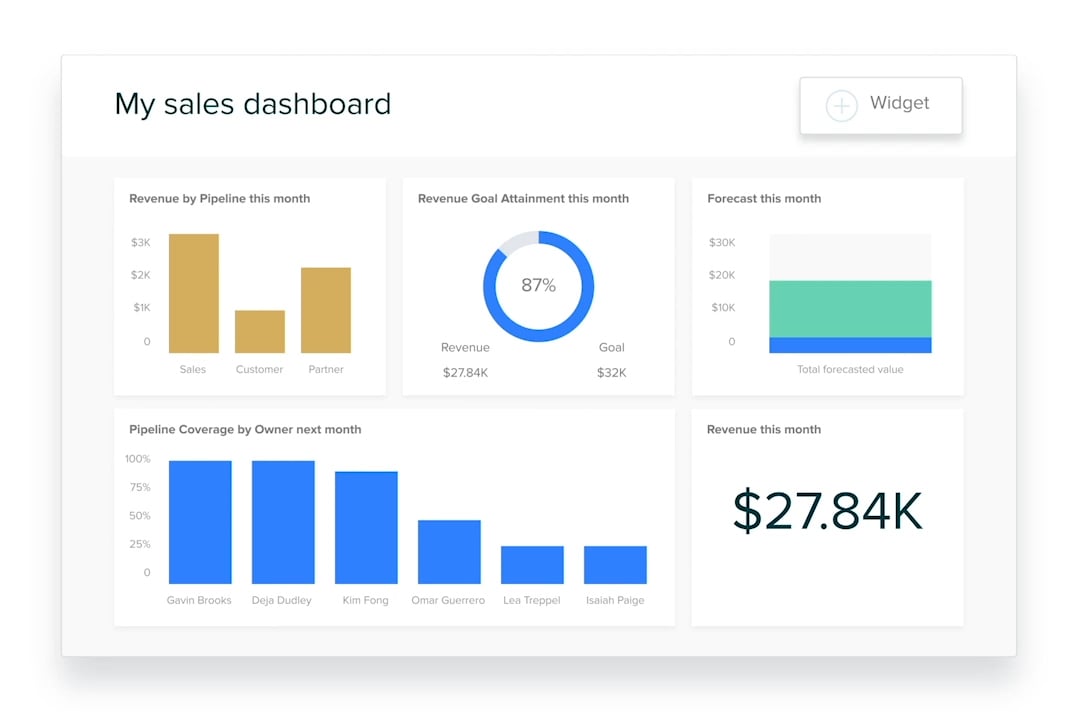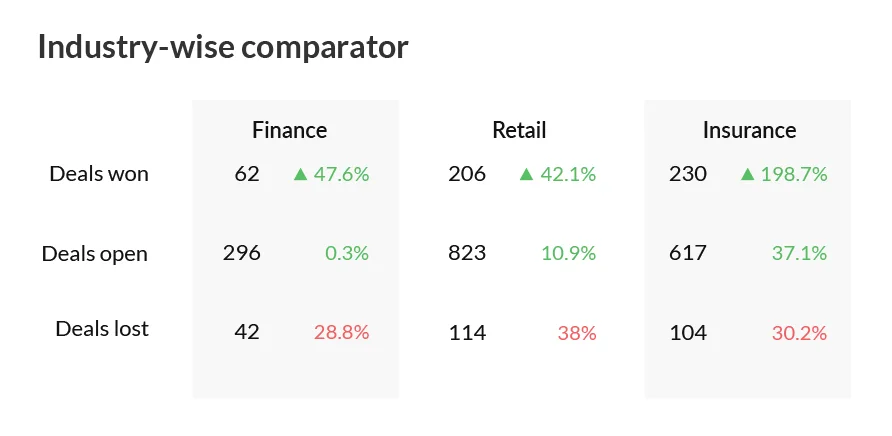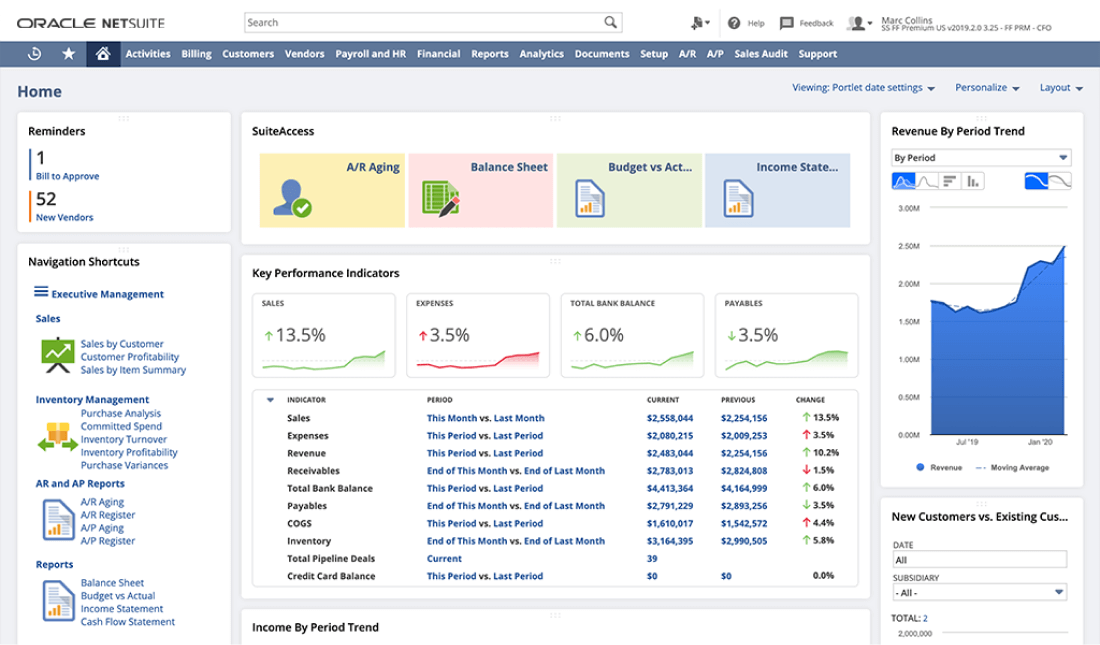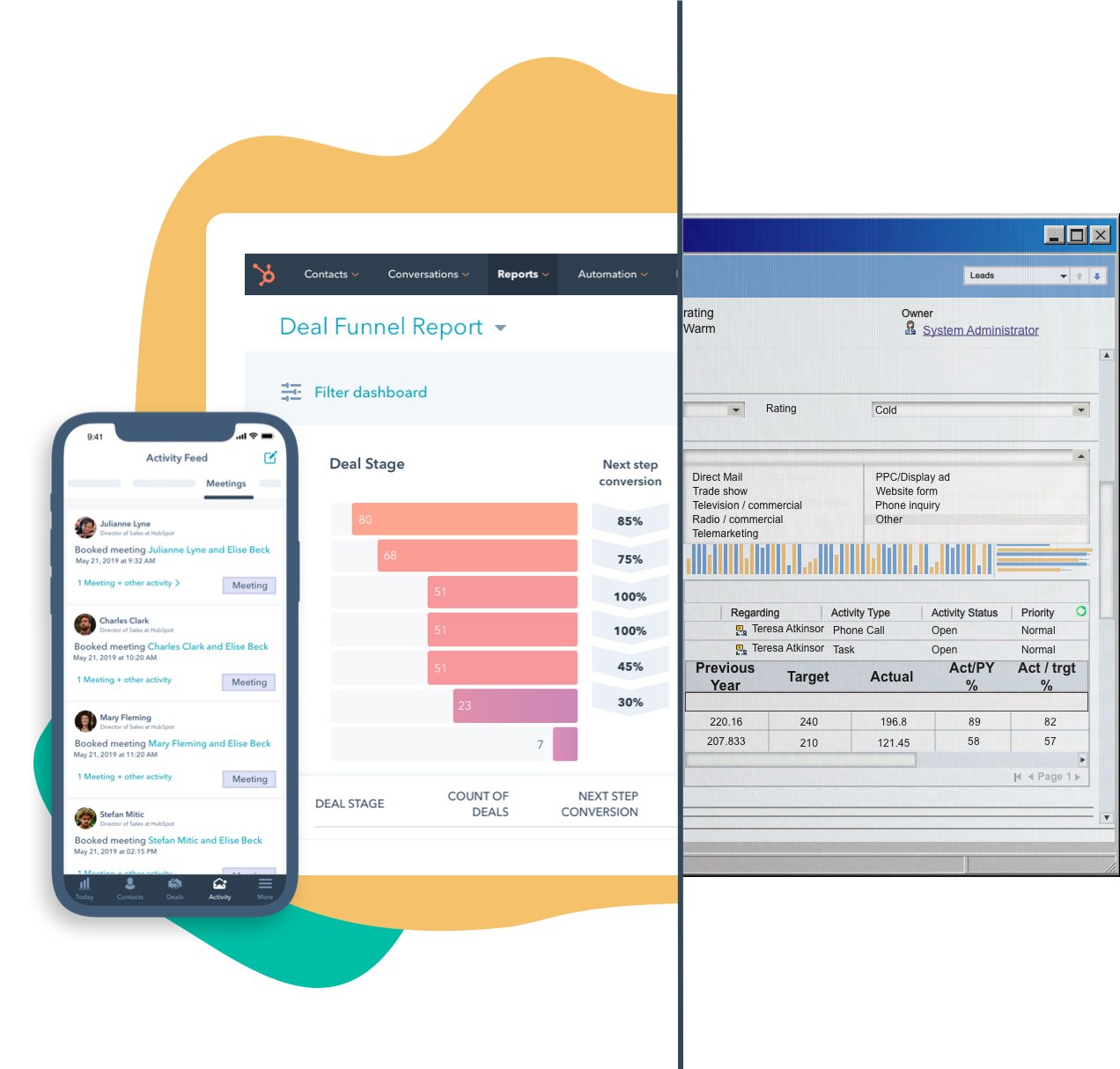Ultimate Guide on CRM Automation: Best Tools & Reviews
Boost your sales production with CRM automation. Know more in this ultimate guide to help your customers and sales teams.
A full guide on CRM automation
Last updated May 11, 2023
CRM software is a must-have if you’re planning for growth or trying to improve productivity. And one of the best ways of using CRM to boost sales is to take advantage of time-saving automation tools.
In this comprehensive guide, we’ll answer the following questions about the functions and benefits of CRM automations, discuss key features, and give an overview of the top seven CRM platforms on the market today.
- What is CRM automation?
- How do you benefit from it?
- What are the key features of CRM automation tools?
- What is the difference between CRM and marketing automation?
- Top 7 CRM automation tools
- How to choose the right automated CRM software
- Frequently asked questions
- Ready to give an automated CRM a try?
What is CRM automation?
Spreadsheets and manual data entry don’t just waste time. They steal time. Every hour spent performing a repetitive administrative task would be better spent engaging with customers, strategizing new sales tactics, or networking with contacts. Instead, many businesses find their teams’ schedules monopolized with tedious—but necessary—activities. That’s where CRM automation tools come in.
CRM automation is a process that automates the repetitive tasks associated with sales, marketing, and customer service. Obviously, that covers a very broad range of activities. Each automated tool performs a different task, either operating at scheduled times, after being triggered by a specific action, or through the use of Artificial
Intelligence. You simply establish the criteria, customize the settings, and the automation sales software takes care of the rest.
How do businesses get started with CRM automation?
The first step in getting started with automated CRM software is researching and investing in a platform that includes tools that automate. The best CRM platforms have easy interfaces that are simple to navigate, so your team can adopt it without any hassle.
If you’re looking to get started, begin with these steps to make sure you know what to look for.
- Set a firm goal for what you want your CRM automations to do. Are you looking to cut personnel costs? Shorten your sales cycle? Talk to your heads of departments and gather information about the activities that are taking up the most time or causing the most number of errors. If you want to know how to get started with automating CRM sales, the best place to begin is where you’re currently falling short.
Identify the features that would help resolve your issues. Once you’ve done a review of your operations and identified where your process is faltering, you need to know which features are out there that will solve them. Research and compare different software options, and don’t forget to take note of which programs can be integrated with the sales tools you’re already using.
Take note of your operations. Don’t forget to take geography into account. If your business has remote or hybrid staff members, you’ll want to look for cloud-based and mobile CRM automation tools. The flexibility provided by these platforms will let your team use their tools even when they’re away from their office or using a mobile device.
Test drive a platform. Once you’ve narrowed your list of CRM automation providers down to the best choices, you’ll definitely want to take advantage of any free trials offered. This way, your team can get a feel for the platform’s usability before purchasing.
Who uses automated CRMs?
Any business with a strong focus on sales and customer service can benefit from automated CRMs. They’re used in industries ranging from education to manufacturing, retail to telecommunications, and more. And due to the pandemic, virtual selling is more popular than ever, which means that many ecommerce businesses are also getting in on the action.
There’s no rule for how large or small a business must be to utilize CRM automations. In fact, there are many attractive options of sales software for small businesses, as well as enterprise solutions for larger operations. The general rule seems to be that if your business relies on healthy, sustainable customer relationships in order to maximize profits, you can benefit from using automated CRMs.
Now, let’s look at a few examples.
CRM automation examples
-
Example #1: the follow-up scheduling message
A potential customer is gathering quotes. Their offices are moving locations, and they need to estimate how much the move will cost them. After browsing your company’s site, the lead requests a meeting to get a quote from one of your representatives. The moment the request is sent, your automated process emails the contact a link with a scheduling calendar. Within two minutes of requesting the meeting, the lead selects an available time slot with your agent, and the agent’s calendar is automatically updated. - Example #2: the appointment reminder
Your sales reps are having an extremely busy quarter, and many of their schedules are jam packed with appointments and other tasks. You customize your automations to send out notifications at designated intervals to ensure that your reps have enough time to prepare for their appointments. Plus, with scheduling and text messaging integrations, those notifications are sure to be sent where your reps will see them every time. - Example #3: email templates & personalization
Your latest email marketing sequence is ready to go out to a batch of leads. Instead of having your sales reps manually enter personal information like names and titles into each individual email, embedded merge fields in your email templates automatically fill those details. Every email goes out with a tailored, personalized feel - with barely any effort on your end.
How do you benefit from CRM automation?
The most obvious benefit of automation is that it saves time. By eliminating the repetitive, mundane tasks associated with sales, you’re better able to move more leads through the sales cycle, and as a result, close more deals. But how exactly does CRM automation contribute to more sales?
Increased lead qualification rates. The best CRM software makes it hard for good leads to fall through the cracks. Automated lead nurturing campaigns and custom fields make it easier to capture and analyze accurate qualifying information from potential customers.
Increased lead conversion rates. With automated features like lead distribution, the most promising leads get paired with the best reps, making it more likely they will be converted to customers. Plus, automating simple tasks like follow-up emails and scheduling makes it easier for your team to respond quickly when a lead shows interest.
Increased customer satisfaction. Customers today expect their needs to be met quickly. CRM automations help sales and CS teams deliver fast, effective service to leads and customers, ensuring that your buyers will continue patronizing you instead of the competition. Plus, with automated tools like AI chatbots, you can extend your service reach in order to offer assistance to more customers, even without an army of CS reps.
What are the key features of CRM automation tools?
-
Contact management & data entry: CRM automation tools help you quickly capture, store, and access contact details. When contact details change, CRM automation tools automatically update your contact database so reps don’t have to manually input new information.
Personalized & omnichannel messaging: The top CRM platforms include the option for your software to send personalized emails or content automatically. These emails and messages can be triggered when leads take an action such as entering their email address into a form on your website. Then, the system inserts personal details submitted with the email address in the message, and automatically sends it out so that the lead can take the next step in the sales process.
AI Chatbots: Human communication is important in sales. But as a supplement to this, AI chatbots truly take CS to the next level. AI in sales is constantly making leaps forward in terms of functionality. Today, they can converse naturally with customers while answering questions, guide customers to helpful resources, and seamlessly route clients to qualified reps. Chatbots also allow customers to get support on their own time, even after business hours when your reps are relaxing at home.
Logging and monitoring customer interactions: CRM platforms automatically log each customer interaction within the contact database. This way, reps don’t have to rely on data entry or memory to know exactly when they spoke with a customer last. Plus, when a new rep pulls up a customer file, they have all the information they need to understand how to proceed.
Sales process automation: Most CRM platforms offer a visual drag and drop pipeline tool that allows reps to see exactly where each customer is on their customer journey. This customizable tool lays out the actions required in easy-to-follow steps, ensuring that your carefully crafted sales process is being utilized to its best potential.
What is the difference between CRM and marketing automation?
CRM automations are typically more geared towards sales and CS functions. That’s because sales and CS responsibilities regularly involve interacting and building relationships with prospects and customers.
Marketers, on the other hand, don’t usually engage directly with the customer base. Marketing automation tools, therefore, handle more top-of-funnel activities, where customer engagement is minimal or nonexistent. The moment engagement happens and the relationship is born, the lead is passed to the sales team, where the CRM automation tools will help them take over and close the deal quickly.
We’ve already explored several CRM automation tools. Now, let’s look specifically at the features of marketing and sales automation tools.
CRM marketing automation
Marketing automations are designed to make it simpler for marketing teams to create and distribute content to potential customers. It’s their job to generate the highest quality leads possible, making it easier for the sales team to close deals down the road.
The key features of most marketing automation software include:
Lead management: From gathering contact information to scoring and assigning leads to sales reps, marketing automation tools shave off hours or even days from the amount of time these tasks would normally take doing them all in a spreadsheet.
Email campaign management: Create personalized email templates and send communications the second a lead opts in to receive communications from your company, allowing you to engage with hot leads even while your hands are busy elsewhere. You can also automatically send gated content the second a lead shows interest.
Social campaign management: Social campaign management tools let you post your marketing materials on your various channels, track social media interactions, and analyze customer behavior and preferences.
Reporting & analytics: Generate and distribute reports on whether leads open email communications, track engagement with social media posts, and analyze customer behavior to better understand your customer base and create even more targeted campaigns in the future.
CRM sales automation
Sales force automation tools are built to assist salespeople quickly and efficiently move leads through the sales process. The sales process takes place between two individuals - the prospect and the salesperson. Sales automation tools help salespeople with tasks directly associated with carrying out a simple, error-free, responsive sales process. They include:
-
Scheduling tools: Scheduling meetings with prospects can turn into an endless chain of back-and-forth emails. Automated scheduling tools allow leads to easily select available time slots without going through the constant email exchanges.
Omnichannel communication tools: Salespeople need to be able to reach their customer base wherever they are, including social sites and messaging apps. They also include outbound calling center automation software,
Pricing and quoting tools: Salespeople need the tools to quickly generate pricings and quotes for hot leads. CRM sales automation tools let agents quickly manage tasks like quota setting, configuration, negotiation, and contracting.
Pipeline management: Track action plans and monitor lead progress with more control over every touchpoint as they move through the sales process. These sales automation CRM tools give agents a visual view of their progress, so they always know what the next step is.
Top 7 CRM automation platforms
Zendesk Sell

Zendesk Sell’s automation platform was specifically designed to make customer relationship management simple. The software automatically collects all customer data and keeps it accessible and in one place, saving your reps from manually entering names, emails, and other information. Plus with mobile CRM and cloud technology, Zendesk Sell allows for maximum flexibility, giving reps the opportunity to automate their tasks even when they’re not in the office.
Zendesk offers a robust selection of sales automations in and, with a huge selection of integrations, with marketing tools as well.
Features:
- CRM dashboard
- Door to door sales software
- Sales tracker
- Contact management
- Lead management
- Live chat
- Reporting & analytics
Quickbase

Quickbase provides CRM software that’s meant to be customized to your business’s specific needs. A central dashboard includes a selection of ready-made applications, and also allows users to create their own. With Quickbase, users can add regularly scheduled automations, plus automations triggered by a change or update in data.
Quickbase also features sales CRM automations for internal collaboration among departments. It also has tools for automatically nudging reps when it’s time to follow up with a customer, in case they forget. Users also appreciate Quickbase’s customizable pipeline tool and workflow automations, which make it easy for reps to see what step to take next with each customer.
Features:
- Client portal
- Forms creation
- Workflow management
- Contact database
- Scheduling
Zoho CRM

Zoho CRM’s “360 degree” customer relationship management solution offers both CRM and marketing automations. The software markets to businesses of any size, and offers different plans for small businesses and enterprise companies.
On the marketing end, the software automatically generates leads when they interact with company materials. Next, the software scores leads, and distributes them to the right sales reps. It also features automated emails and an AI chatbot. Additionally, Zoho tracks and logs each interaction reps have with customers, so your business will always have an accurate and complete record of conversations.
Features:
- Lead capture
- Calendar management
- Live chat
- Pipeline management
- Relationship tracking
NetSuite CRM

NetSuite’s CRM software provides a centralized location for users to access all customer, lead, and supplier information. The platform features automated notifications for when there is an opportunity to upsell or renew with an existing customer.
Additionally, NetSuite offers automation solutions for targeted marketing campaigns. By gathering demographic data, the software can find potential leads and send them personalized campaign materials automatically. It also offers a centralized location to track all data related to campaigns, such as who opened emails and what potential customers responded to most.
Features:
- Collaboration tools
- Communication management
- Contact database
- Automated email
- Alters and notifications
HubSpot

Hubspot’s CRM software features a specific “hub” for five different areas of business - marketing, sales, service, content management, and operations. The Sales Hub offers sales automation tools like personalized follow-up emails after meetings and scheduling tools. Users can use premade email templates or build and share their own among team members.
Hubspot allows users to personalize workflows. It sends notifications when a contact takes a noteworthy step, or when it’s time to follow up with someone. The platform also encourages users to stop and edit automations at any time, in order to keep interactions human.
Features:
- Client tracking
- Email marketing
- Pipeline management
- Lead distribution
- Calendar/Reminder system
Pipedrive
Pipedrive is a CRM system with a focus on lead capture and management. The software features a mobile version of its CRM dashboard, as well as integrations with many popular business apps so users don’t have to worry about switching between browsers constantly.
Pipeline offers a customized pipeline tool, which users can set up to trigger automations as a customer moves along their lifecycle. For example, users can set the software to automatically create a deal each time a new contact is added. Pipeline also features the option to automatically send personalized emails to leads, so communications stay friendly and personable.
Features:
- Call list management
- Lead management
- CRM dashboard
- Third-party integrations
- Reporting & analytics
Nutshell

Nutshell is an all-in-one CRM system with a focus on email marketing. The CRM software updates information automatically each time a rep communicates with a lead, or a lead moves along the sales pipeline.
Sales automation features, like lead distribution, allow leads to be paired with sales reps based on criteria users input themselves. Users set step-by-step goals within the software’s pipeline tool, giving reps a clear picture of what actions they need to take to reach company goals. Additionally, Nutshell’s automated pop ups let teams set up recurring notifications so they don’t have to remember every little task on their own.
Features:
- Email marketing
- Lead generation
- Task management
- Template management
- Mobile access
How to choose the right CRM automation tool?
There are a few things to consider when choosing CRM sales automation tools. Ask yourself these questions to help get you closer to selecting the right software for your business.
- Are repetitive administrative tasks putting a strain on your business? If so, which ones?
- How large is your business? Some platforms offer automations specifically for small or large businesses, while others are flexible and grow with you.
- What automations would be most beneficial to your sales process and customer base?
- Are you looking for a platform that includes both marketing and sales automations?
Frequently asked questions
Ready to give an automated sales CRM a try?
If you’re ready to leave repetitive tasks behind, Zendesk Sell is a powerful, user-friendly CRM software with an array of customizable automations. Zendesk Sell boasts sales automations to speed up the sales process and ensure that no lead falls through the cracks.
Interested but not ready to make the leap? Zendesk offers a 14-day trial, so you can try out sales automation CRM like automated data entry, personalized emails, and a customizable pipeline for free.
